Akuch Anyieth, from La Trobe University shares her story in this piece republished from The Conversation.
My name is Akuch Kuol Anyieth. I am South Sudanese by birth, Kenyan by migration and life experience, and Australian by migration and citizenship.
I spent my childhood and some of my teenage years in Kakuma, a refugee camp in remote, arid, north-west Kenya, near the border with South Sudan. My childhood memories of the camp include hunger and thirst, dust storms, bites from scorpions, outbreaks of malaria and cholera — and violence.
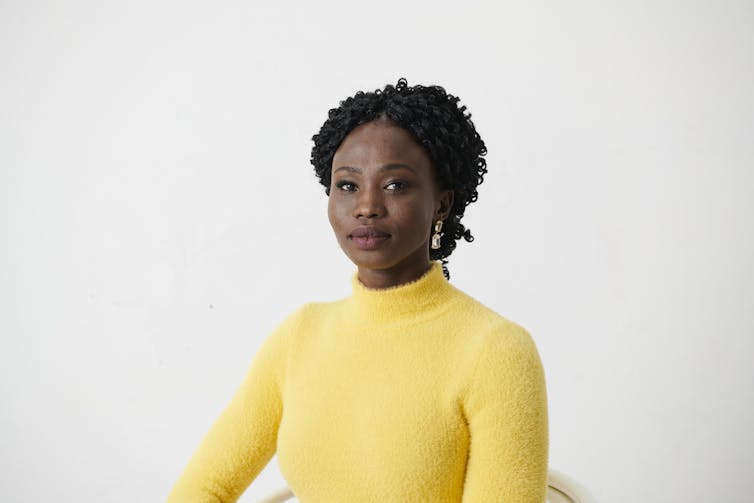
Usually, the South Sudanese name their children after family members: grandfathers, grandmothers, aunties and uncles. Names can also be chosen to reflect the circumstances of a child’s birth. In the language of the Dinka tribe of South Sudan, tong means war, so the names Tong (male) or Atong (female) indicate that a child was born in a period of war.
My mother Mary Achol Anyuon gave birth to my sister Atong in 1988, during the Second Sudanese Civil War, in her birth village, Mar, on the White Nile in central South Sudan.
Baba, my father, Kuol Anyieth, was born in South Sudan and raised in Khartoum before the war. He completed his secondary education and most of his university studies in mechanical engineering there, before going to visit family in Mar, where he met Mama. According to both of them, it was love at first sight. They got married immediately and moved back to Khartoum, where my eldest sister Ajok was born.
Baba secured what Mama often referred to as a great job — as a mechanical engineer at a vehicle-production company established during the British colonial period. Baba worked for the company for many years, moving between the headquarters in Khartoum and a branch office in Wau, the capital of the state of Western Bahr el Ghazal, where my brother Anyieth was born.
As the war escalated, tensions rose between the Arab management and the Sudanese employees. When the company shut down, Mama and Baba moved back to Mama’s village.
‘Unknown’
My mother lost three children, Deng, Yom and Thon, to diseases caused by infections that could have been simply treated if the country was not in chaos. After Atong’s birth, she decided she had had enough of burying her dead children and would not have any more.
Nevertheless, three years later, I was born. All our family and friends were surprised. For three years Mama had kept her promise to herself, in a country with no access to contraception for women. Hence my name: Akuch, which in Dinka means “unknown” or “I don’t know”. I was the mysterious child who defied all the odds to be born, and to survive displacement, poverty and violence.
Towards the end of 1990, Baba heard that a refugee camp for displaced Sudanese refugees had been set up in Ethiopia, where the UN was distributing aid. The second civil war between the North and the South of Sudan had broken out in 1983, and as the war escalated Southerners escaped to this camp and to other neighbouring countries.
Baba wanted to move the family to the camp, but Mama was pregnant with me, so he decided to walk there with Anyieth. Mama says it was Baba’s way of teaching Anyieth how to be a man — to protect and provide for your family. They were going to try to get a portion of land in the camp, erect a shelter and then come back to Mar to get pregnant Mama, Ajok and Atong.
Baba and Anyieth were still in Ethiopia when Mama gave birth to me and tribal war broke out between the Nuer and Dinka tribes in South Sudan.
Mama ran with us from one village to another, seeking refuge. Baba and Anyieth started walking back to Sudan, hunting for us in every village. Somehow, we heard that they were heading towards a village call Kidepo, located in Eastern Equatoria. By the time we arrived, Baba had built two shacks for us there.
The family was finally reunited, but not for long. As soon as Baba settled Mama in Kidepo, he left to serve in the Sudan People’s Liberation Army driven by his undying dream of defending his nation of South Sudan — as were so many Sudanese men. My father was also determined to pursue his mechanical engineering career in the army. After Baba had gone, we moved from one village to another in Eastern Equatoria, for about three years. Villages were often attacked, or we would run out of food and have to move somewhere more peaceful.
When Mama heard that the United Nations High Commissioner for Refugees had set up the Kakuma Refugee Camp in Kenya, she decided that we had to find a way to get there — for our safety, and in the hope of one day migrating to a western country.
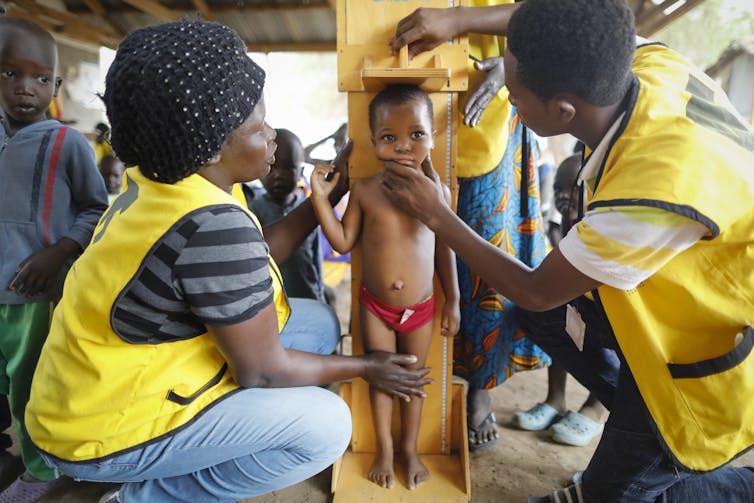
Waiting for the cattle truck
I was five years old when I began the journey to Kakuma. With me were my mother, my two brothers — Anyieth and my new younger brother Gai —and my sister Atong. (My older sister, Ajok, had got married while we were in Laboni in South Sudan and moved to another refugee camp in Kenya.)
One evening, in the back of a truck, I heard my mother talking about me:
This child has been sleeping the entire journey and I am starting to wonder whether she has died of starvation. How can she sleep on this bumpy road, with the children screaming and soldiers stepping all over us?
Hours later, I opened my eyes. “Mama, where are we?” I bleated.
If you hadn’t been sleeping, you would know. Even Gai already knows where we are. We are in Lokichogio, on the border between South Sudan and Kenya, in a reception centre for displaced people seeking refuge in Kakuma.
None of that meant anything to me, of course.
I sat up straight and looked around. Gai and I were sharing a thin straw mat in a shelter with a concrete floor. Everywhere, people were crowded into structures made of plastic sheeting with tin roofs. Children were screaming and smoke from cooking fires hung in the air. Mama, Gai and I kept our place in the shelter, along with countless other families, while Anyieth and Atong went off to make friends with the rest of the children, just like they always did.
We stayed in Lokichogio for several weeks during late 1995 and early 1996, waiting to be granted refugee status so that we could move on to Kakuma. We also had to wait until a cattle truck became available to transport us the 121 kilometres to Kakuma.
Conditions had worsened in Sudan; more than 30 new families and other individuals arrived in the centre while we were there. Many were unaccompanied minors who had been separated from their families or lost their parents in the war. These children were usually processed first. There were also mothers with their children, but without their husbands, who had either been killed or, like my father, remained in the army fighting an unending war, in the hope of protecting their country.
The conditions in the centre were appalling. Children couldn’t run around and play. There was no protection from the heat: the shelter turned into an oven during the day and there were no trees. And there was nowhere to escape from the crowds either.
Around the centre was a high cyclone-wire fence topped with razor wire, something I had never seen before. Gai and I would lean against the fence, waving at everyone who passed by. It was our only entertainment. We would count how many people waved back at us; whoever got the most waves could wear the pair of flip-flops we had to share because Gai’s had been stolen.
Atong’s flip-flops were a no-go zone; she was not to be messed with. At eight-years-old, she had quickly become a fighter, standing up to all the kids her own age and some of the older ones too. When that girl placed a hand on her hip, sticking her chin in the air and pointing her index finger at you, you didn’t dare say a word. The only person she did not try her attitude on was our brother Anyieth, now 13-years-old.
When the truck for Kakuma arrived each day at midday, everyone lined up quickly, hoping their name would be called out by the UN workers. If it was called out, you had to get ready to leave at once. Like everyone else, we wanted to get out from behind those wire fences and away from the smelly crowd — all those body odours and the stink of babies’ poo and pee. The water brought into the centre was only for drinking; there was never enough for cooking and showering.
One day in February 1996 Mama dragged us through the crowd towards the front of the queue. When we heard her name called, followed by our names, we realised Anyieth was nowhere to be seen. Mama was in despair: she was convinced the truck would leave without us and we would get sick or die of starvation waiting for another one.
We split up to search, calling Anyieth’s name as loud as we could; Mama told us our lives depended on it. But we knew he must have gone to the Loki city centre with his friends. He usually returned later when it was cooler, rushing to get back before the 5 p.m. curfew.
That day, for some reason, he came running back at midday, breathless and soaked in sweat. Mama did not bother chastising him then; at least he was there.
We were loaded onto the truck like goats, but, as we drove off, the hope we had invested in Kakuma grew.
‘Shut your yapping mouths’
On the truck, Mama berated Anyieth:
If you don’t change your ways, especially your daytime disappearing acts, I’ll send you back to Baba and you can go off and fight the war with him! You are not doing your duty as the eldest son.
After all, that was what any true Dinka boy did in the absence of his father — he became the head of the family. Mama was desperate for Anyieth to help her look after us. But Anyieth’s way was to stay quiet and continue to do his own thing.
Another woman joined in, agreeing with Mama that as women they were wasting their time, energy and resources raising sons who did nothing but wait to pick up their fathers’ guns to fight the endless war. They went on for a while, blaming the government in North Sudan; the late John Garang de Mabior, who founded the Sudan People’s Liberation Army; the soldiers who agreed to fight; the religious differences between North and South Sudan; and especially the North for not letting the Southerners be.
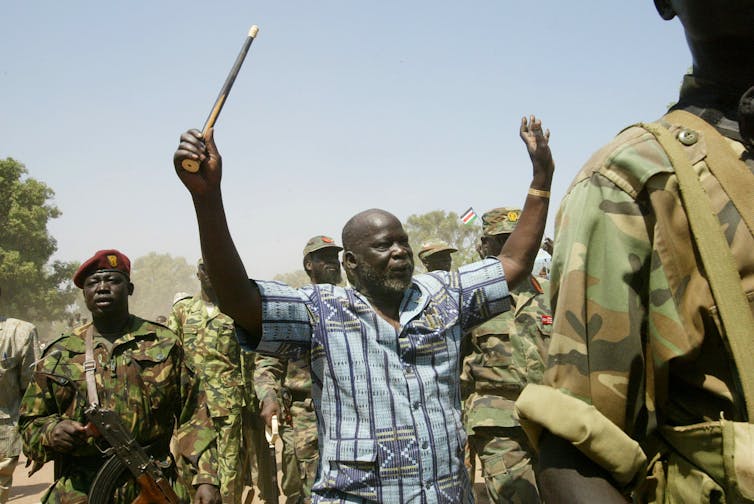
All of a sudden, a soldier shouted at Mama and her new friend.
If you don’t shut your yapping months, women, I’m going to stop the truck and throw you out to be raped by those wild Turkana men!
I can tell you that it sounded worse in Dinka. The word “rape” in Dinka is not something you can say out loud in public, and especially not to a woman.
The man must have been around seven feet tall. He had a deep, domineering voice, and big, wide, red eyes. The whole truck went quiet, except for the crying of some small children.
Arriving ‘nowhere’
Kakuma means “nowhere” in Swahili, and akuma means “to be judged” in Dinka. Both words sum up the experiences of those in Kakuma: “to be judged in nowhere”.
The local Kenyan people are called the Turkana, and they were notorious for robbing, raping and murdering the refugees living in the camp. The only access to Kakuma was by the degraded road from the towns on either side, Lodwar and Lokichogio. Temperatures varied between the high 30s and 45C, sometimes dropping to the low 30s at night, forcing people to sleep outside their tents and shacks.
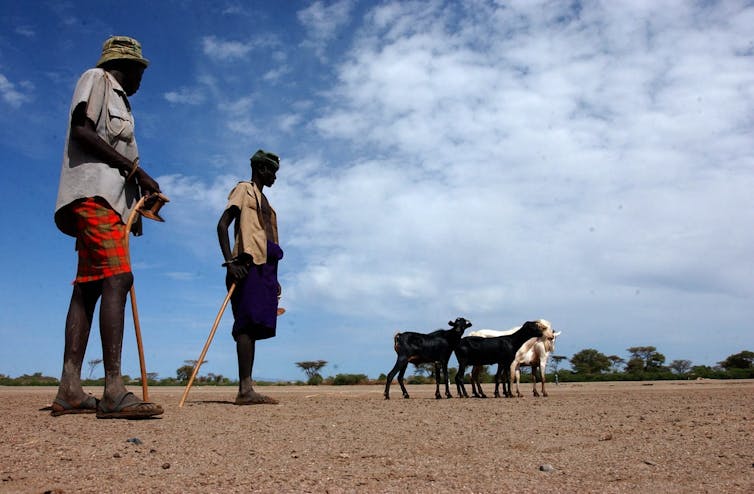
A nomadic tribe, the Turkana people survived by selling charcoal and firewood, by begging or robbing houses, and by raising cattle. They could not farm due to the extreme weather conditions and lack of water. And crop seeds were difficult to obtain.
When the refugees settled in Kakuma, they traded maize, flour and oil for Turkana charcoal and firewood, but as time went by, refugees had to manage with the little they had left until the next food distribution. Sometimes the UN would distribute firewood, which made it even harder for the Turkana people to sell their own wood, and made them hostile towards the refugees.
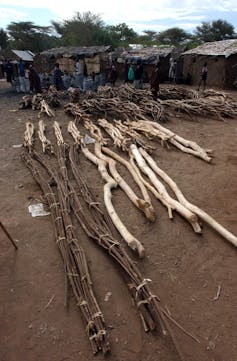
Kakuma had been operating for about four years when we arrived. Set up in 1992 to provide shelter for the South Sudanese “Lost Boys of Sudan” (thousands of kids who had been displaced by the civil war), the camp grew rapidly.
Kakuma was filled with long-term refugees from many countries, like Ethiopia and Somalia, as well as South Sudan, for the most part living in desperation, all waiting to be granted asylum in first-world countries.
While we were there, it was divided into three sections: Kakuma One, Two and Three, which were further subdivided on the basis of ethnic groups, tribes and clans (family divisions within tribes). We were placed in Kakuma One, Group 11, which was populated by different clans from ours. I was not surprised that Baba had arranged for us to be in this group; he was appalled by the idea of people living in different tribes, a division he considered harmful to South Sudanese unity and peace.
After hours of bumping around in the back of the truck with no water breaks, we arrived in central Kakuma town, where we were greeted by a relentless dust storm. We received initial help from our relatives on Baba’s side of the family. They had already been processed and had agreed to host our family of five on a short-term basis.
At first, Mama was not happy with the idea of us settling in Kakuma One — she would have preferred us to be with her relatives in Kakuma Two — but things were better once we started making friends. At least Gai, Atong and Anyieth did; I wasn’t the type of child who made friends.
Ajok’s in-laws were in Kakuma One, Group 13, and they were happy to help Mama look for a piece of land where we could build at least one tin-roofed, mudbrick shack.
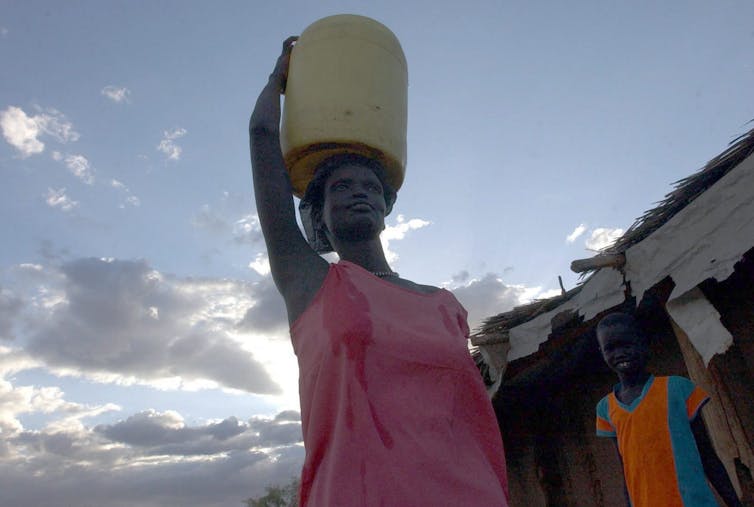
Communication with the outside world was hard in Kakuma. There was only one radio station and you had to make an appointment days or weeks ahead to call to Sudan or Loki. This was obviously no help in an emergency. We would go several months without any communication with Baba. Mama relied on people travelling to and from Sudan to pass on messages that we were okay, and Baba sent return messages to us.
After a couple of weeks, we had overstayed our welcome with our relatives. Tensions were growing: my siblings and I fought over hand- made toys with our relatives’ three kids, and Mama was tired of being told what to do by their mother. But we still hadn’t found somewhere else to live. The only available plots of land were located at the edge of the group, where there were few or no neighbours, which left us at risk from attack by the Turkana people.
At last we heard about a place located in Group 56. Mama leapt in and bought it for 15,000 Kenyan shillings, the equivalent of A$150. She was thrilled. We could not have afforded it without the help of my Uncle Dut, who had migrated to the United States as a Lost Boy.
Group 56 was mainly populated by people from Central Equatoria in South Sudan, along with a couple of families from other mixed tribes. Our compound, about 30 square metres, had one dilapidated mud brick shack with a polythene-sheeting roof.
A mud-brick shack and school
It was not adequate for us all, but it was ours and we children had space to run around. It flooded constantly in the rain and turned into a furnace during the dry season. We did not have enough money to build another shack or even a kitchen. Mama and Atong waited until late in the evening when it was cooler to cook outside on an open fire.
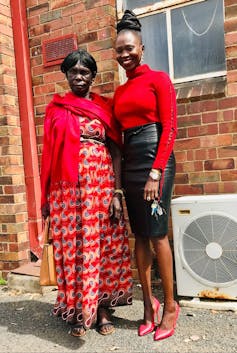
During the day we sat under a small thorn tree outside our mud shack. Mama was strict about us not mixing with the neighbours’ kids — she said we’d be looking for trouble and she was not ready for a fight. But no matter how many lectures she delivered, Anyieth would still go out with his new friends. We rarely saw him during the day; he would only stay home if he was sick.
Soon after we arrived, Mama took us to the nearby Jebel Marra Primary School. We had never been to school before this one. The principal enrolled Gai and me in Grade 1, because we knew our alphabet and numbers. Atong was enrolled in Grade 2 and Anyieth in Grade 4.
Gai was often sick, school became off and on for him. Mama said it was malaria; every illness was called malaria in Kakuma. People were not educated enough to know the difference between a life-threatening disease like malaria and a cold or the flu. Gai complained of headaches, was constantly vomiting and started to lose weight. Mama made him stay home until he got better.
The teachers had no idea about the fights that went on outside the classrooms. The majority of them had only completed the Kenyan Certificate of Secondary Education, the equivalent of Year 12 in Australia. There was no proper authority to check teachers’ qualifications. Anyone who knew their English and Swahili alphabets could become a teacher.
Every grade had five subjects: English, Swahili, maths, science, and Christian Religious Education. My siblings and I now had four languages to practise. As well as learning English and Swahili at school, we spoke Dinka, my mother tongue, and Arabic, because Mama and Baba spoke it to us sometimes.
Our neighbours were from the Equatoria region, where Arabic was widely spoken, and we played with their kids in school, so we all spoke Arabic to each other.
Linguistically, our house was chaotic. During Baba’s short visits he didn’t care whether we spoke in Dinka or Arabic. He believed that the more languages we spoke, the smarter we’d become.
Mama, on the other hand, was strict about us only speaking Dinka at home. “Leave those other languages outside my house! We are the Dinka people and we only speak Dinka in this house.” We hated it — we just wanted to speak Swahili and Arabic. They sounded cool.
This is an edited extract from Unknown: A Refugee’s Story by Akuch Kuol Anyieth (Text Publishing).
Akuch Anyieth, Graduate researcher, Crime, Justice and Legal Studies, La Trobe University
This article is republished from The Conversation under a Creative Commons license. Read the original article.



